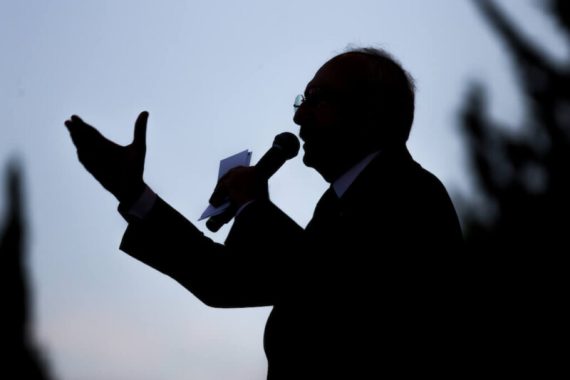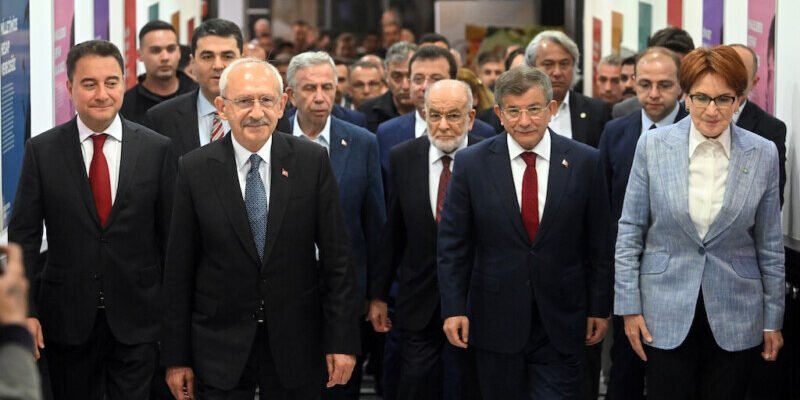With Turkey’s transition to a presidential system in April 2017, after a historic referendum that saw 51.4% of the votes cast in favor of the new system, political parties in Turkey immediately began to adapt to the new system. The presidential system, which requires candidates to win an absolute majority of first-round votes, forged pre-election alliances. It became clear to all opposition parties, led by the Republican People’s Party (CHP), that on their own they could not defeat Erdoğan or the AK Party (Justice and Development Party) under Erdoğan’s leadership.
The rapprochement between the AK Party and the MHP (Nationalist Movement Party) after the July 15, 2016 failed coup attempt merged into an alliance called the “People’s Alliance” for the June 2018 presidential elections. The People’s Alliance was also joined by the BBP (Great Unity Party). This was followed by the opposition’s first serious move to form an alliance: the CHP, the Iyi Party, the Felicity Party (SP), and the Democratic Party (DP) formed an alliance for parliamentary elections, but disagreed on supporting a common presidential candidate. The June 2018 presidential election was a disaster for the opposition with Erdoğan’s winning 52.59% of the vote in the first round.
Over the past few years, Turkey has experienced a major economic crisis and recently a devastating earthquake. This led many political analysts to surmise that Erdoğan’s long, invincible reign in Turkish politics may be coming to an end with the presidential elections of May 14. Nevertheless, the opposition had to take over the reins tight and embark on an impossible mission: to bring together Turkey’s liberal, democratic, right-wing, left-wing, Turkish nationalist, and Kurdish nationalist circles and societal segments. This ideologically incoherent, politically unstable, and sociologically irreconcilable alliance united for one purpose: to overthrow President Erdoğan.
The coalition formed by opposition to Erdoğan was named the “Nation Alliance” or the “Table of Six,” which included most of the political groups in the opposition except the HDP, which contested the May 14 general elections under the YSP (Green Left Party). The YSP, overwhelmingly dominated by Kurdish ethno-nationalists, including some far-left political groups, did not nominate a presidential candidate, which translated as open support for Kemal Kılıçdaroğlu.
The implicit inclusion of the Kurdish ethno-nationalist separatists in the coalition created an insurmountable ambiguity and a bizarre situation for the opposition. If there is one thing that Turkish society as a whole would not accept, it is an overt or covert coalition with the HDP, the political wing of the PKK terrorist organization, as Erdoğan’s discourse reveals on every occasion. Kılıçdaroğlu’s promises to release Selahattin Demirtaş, the currently imprisoned former co-chair of the HDP, to grant autonomy to the Kurdish-majority provinces, and his perpetual silence to the statements of the leading PKK figures supporting his candidacy were perceived by most of the Turkish people as an imminent threat to the unity of the state.
The rallies of the opposition in the eastern and southeastern provinces of Turkey brought the tacit coalition to the surface. The CHP and YSP flags were waved together, and especially the victory signs by Selvi Kılıçdaroğlu, the wife of Kemal Kılıçdaroğlu, and Dilek İmamoğlu, the wife of Istanbul mayor Ekrem İmamoğlu, angered Turkish people who frowned on the now obvious enlargement of the alliance to include Kurdish nationalists in an already Kemalist, liberal, secular, conservative, and nationalist coalition.
This incoherence led a wider public to see the opposition as insincere, unreliable, and unsustainable, so they once again turned to Erdoğan because he symbolized stability and a kind of idealism for the nation despite the economic crisis. The result on May 14 was yet another electoral defeat for the opposition candidate —for the 11th time—with 44.88% of the vote, and another victory for Erdoğan with 49.52% of the vote.
President Erdoğan pioneering the national will, yet not necessarily adhering to a nationalist view, has managed to regain the confidence of the masses and is now very close to winning the runoff on May 28, 2023, on the eve of the symbolically important day of the conquest of Istanbul by the Ottoman Sultan Mehmet II, the Conqueror. The irony is that a few days before the runoff, the opposition, as if lurching from one frustration to another, insists on the strategy that already cost them the election. Once again, they are attempting a “mission impossible.”
To win the votes of Sinan Oğan, a right-wing candidate who surprisingly won 5.17% of the vote, Kılıçdaroğlu’s newly formed campaign team clumsily and abruptly shifted the focus of the discourse to an anti-refugee and nationalist one. On May 24, after long negotiations, Kılıçdaroğlu was able to reach an agreement and secure the support of Ümit Özdağ, the far-right leader of the Victory Party, a staunch nationalist and the most vocal political figure promising the immediate deportation of millions of Syrian refugees. As well as injecting a nationalist discourse into Kılıçdaroğlu’s campaign, Özdağ tacitly revealed on his Twitter account that in return for support he would be appointed interior minister if Kılıçdaroğlu won the runoff.
Recommended
The agreement infuriated YSP voters, who took to social media to express their anger, while the YSP’s central board expressed its dismay over the terms of the agreement between Özdağ and Kılıçdaroğlu. However, despite the agreement, the YSP publicly stated that they would still support Kılıçdaroğlu since Erdoğan is their biggest enemy and called voters to vote for the Nation Alliance’s candidate. It is unknown how people in the eastern and southeastern provinces will respond to this call and whether they will be able to overcome their disapproval. Kılıçdaroğlu’s final political tango could cost him the large number of YSP votes from Turkey’s eastern and southeastern provinces, estimated at around 10% of the country’s total.
Endorsed by Sinan Oğan in his presidential candidacy on May 22, President Erdoğan can comfortably watch his rival’s final political maneuver from left to right. Obviously, this latest episode by Kılıçdaroğlu is also doomed to failure, as the opposition’s deadlocked and irreconcilable coalition has proved to be incredulous, untrustworthy, and incoherent in the eyes of the public.
Kemal Kılıçdaroğlu is again on the horns of a dilemma: he wants to win the support of Turkish nationalists while retaining the support of Kurdish nationalists. The Nation Alliance’s far-fetched election campaign is most likely to fail, and this latest episode may be remembered as yet another political short-sightedness on the part of Turkey’s opposition parties.






